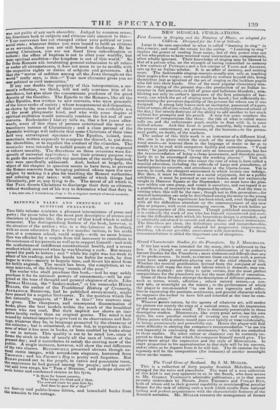NEW MUSICAL PUBLICATIONS.
First Lessons in Singing and the Notation of Music, as adapted for Childrin. .Designed for the Use of Schools.
Large is ihe sum expended in what is called "learning to sing" in this country, and small the return for the outlay. "Learning to sing"
implies the power of reading from notes ; but of this power nine out of ten who profess to have received vocal instruction are, comparatively, often wholly ignorant. Their knowledge of singing may be likened to that of a person who, on the strength of having committed to memory
a few sonnets of' PETRARCA and a few stanzas Of TASSO and ARIOSTO, sets up for an Italian scholar. It is an affair of memory, and nothing
more. The fashionable singing-masters usually aim only at teaching their pupils a few songs ; some are unable to venture beyond this, being themselves just as ignorant of the art of singing as the luckless pupils who fall into their hands. One of the most popular elementary trea- tises on singing of the present day—the production of an Italian in- structor in full practice—is full of gross and ludicrous blunders ; esta-
blishing not only its author's ignorance of the first principles of har- mony, (on which the art of singing must be based,) but sufficiently de- monstrating the prevalent dupability of the persons for whose use it was designed. A young lady leaves such an instructor, possessed of a port- folio of songs, all of one school, (that is, the probably ephemeral school of the day,) but utterly destitute of the ability to add another to her stock without her prompter and his pencil. A very few years numbers the existence of compositions like these : the tide of what is called music rolls on, and the unfortunate pupil, unable to float with it, is soon drifted ashore. And this farce is yearly, monthly, daily repeated, to the present contentment, we presume, of the learners—to the perma- nent profit, no doubt, of the teachers. The author of this little work is an instructor of a different kind. His aim is to place within the reach of the many the pleasures of vocal music—to instruct them in the language of music so far as to enable it to be read with competent facility and correctness. "Vocal music," he justly observes, "is not only an innocent pleasure, but has the recommendation of being a cheap amusement, and therefore pecu- liarly fit to be encouraged among the working classes." This will hardly be believed by those who count the cost of what is here called a musical education, including the addenda of harps and pianofortes, of subscriptions to concerts, and attendance at the Opera-house. Yet is music, in truth, the cheapest amusement in which society can indulge. But then, it must be followed as a social enjoyment, not as a public exhibition : it must be pursued at our own homes, and not exclusively sought in Hanover Square or the Haymarket : we must have the plea- sure within our own grasp, and create it ourselves, and not regard it as a gratification, of necessity to be dispensed by others. And the time is coming when this will be the case ; though not in this generation—for musical instruction can only be distributed among the many to the young and at schools. The experiment has been tried, and, even though tried with all the difficulties attendant on the commencement of any new plan or purpose, with most encouraging success. The work before us is the consequence of this success. Though published anonymously, it is evidently the work of one who has himself encountered and over- come the difficulties with which his benevolent design is attended ; and is admirably calculated to smooth and abate those of future instructors. The directions are clear, the definitions precise and comprehensible, and the examples admirably adapted for progressive improvement, blending, it believer possible, amusement with instruction. To these recommendations is added the important one of cheapness.


























 Previous page
Previous page